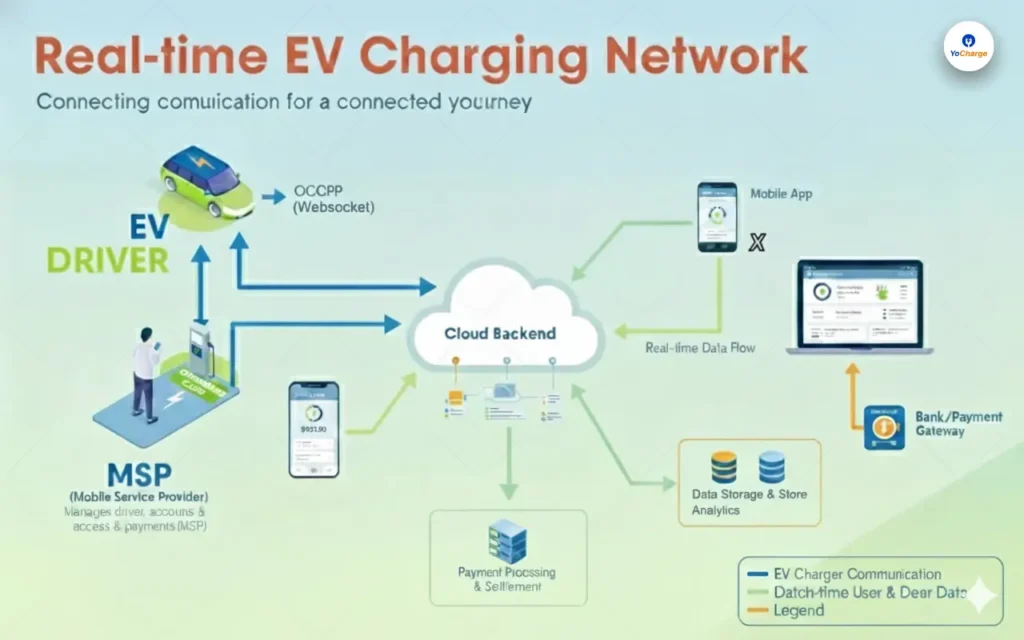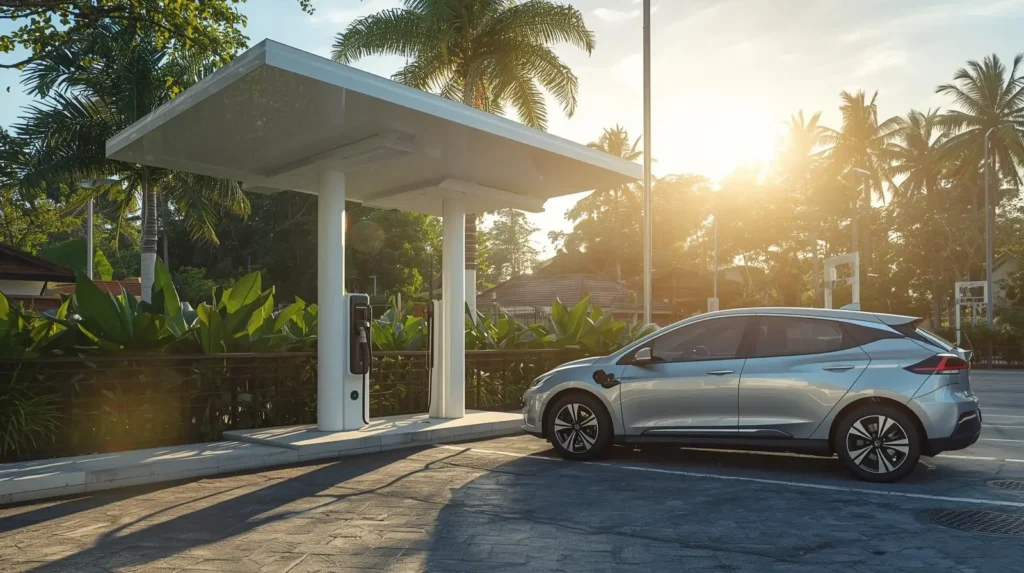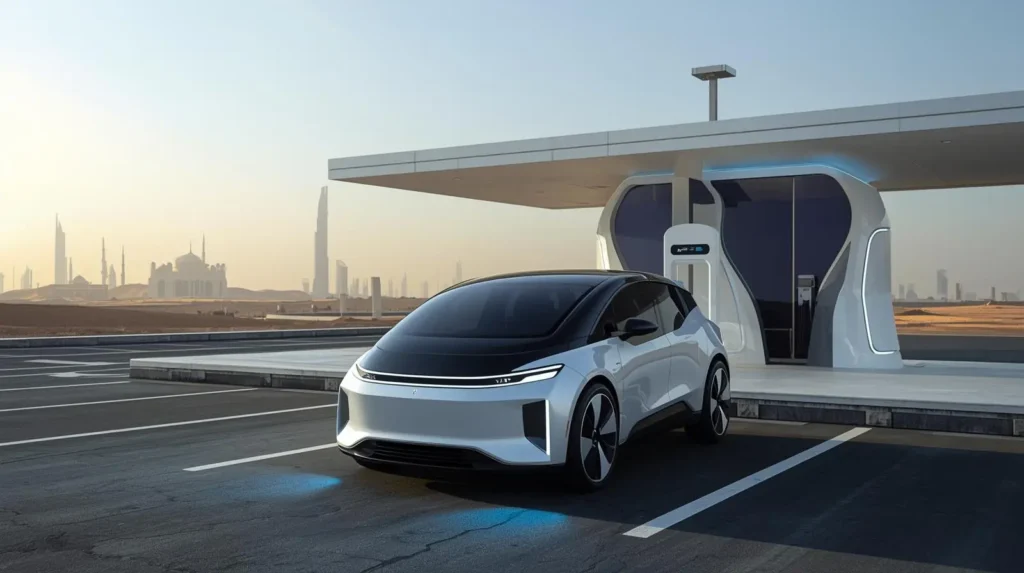
Hotel EV Charging: Imagine owning an electric vehicle but hesitating to hit the road, fearing, “Will I find a charger?” This worry called “charging anxiety,” is becoming a major roadblock as EV adoption soars.
Governments and businesses are stepping up to solve this problem. Local policies now encourage installing more charging stations, while businesses see an opportunity to attract eco-conscious customers by offering charging services.
But here’s a game-changer: Hotel EV Charging. Picture recharging your car while you recharge yourself overnight. It is a win-win solution that’s convenient and sustainable.
Why Hotel EV Charging Stations?
Hotels have unique features that make them perfect for EV charging. First, guests typically stay for several hours or even overnight. This makes it convenient for EV owners to charge their vehicles without worrying about time.
Second, hotels are spread across cities, highways, and remote locations. This geographic distribution can help fill gaps where charging stations are unavailable.
Hotels and Long-Distance Travel
Travelers often choose hotels during long trips. These journeys frequently take them to areas with limited EV charging infrastructure. Hotel EV chargers can solve this problem by offering reliable charging options in these underserved locations.
For example, a hotel in a rural area can provide a charging station that would otherwise be absent for miles.
Types of Charging Solutions in Hotel EV Charging
Different types of chargers can be installed in hotel parking lots. The choice between slow and fast chargers depends on the hotel’s location and guest preferences.
Slow Charging Dominant
Slow chargers are ideal for hotels in city centers or tourist destinations where guests stay longer. These chargers work best overnight, ensuring a fully charged vehicle by morning.
- Setup: Install 8 slow chargers and 2 fast chargers per hotel.
- Best For: Guests staying overnight.
- Pros: Costs less to install and operate.
- Cons: Unsuitable for guests needing quick charging.
Balanced Configuration
The balanced configuration approach ensures flexibility. Hotels near airports or major transit hubs benefit from this balanced model.
- Setup: Use a 50/50 mix of slow and fast chargers.
- Pros: Serves both long-stay and short-stay guests.
- Cons: Involves higher installation and maintenance costs.
Fast Charging Dominant
Fast chargers allow vehicles to recharge in minutes rather than hours. However, the high costs of installation and energy use make them suitable only for high-traffic locations.
- Setup: Install 80% fast chargers and 20% slow chargers.
- Best For: Hotels near highways or transit hubs.
- Pros: Serves travelers who need quick recharges.
- Cons: Involves high costs and greater energy consumption.
Also Read: Everything About Fast EV Charging Technology
Business Models for Hotel EV Charging
Hotels can choose various business models for EV charging. These models depend on the hotel’s strategy, guest demographics, and operational goals.
Paid Charging
Under this model, guests pay for using the chargers. Hotels often add a markup to the electricity cost. Revenue from these fees can cover the costs of installation and maintenance.
Hotels may also enter into profit-sharing agreements with charging operators. This allows them to share revenue while reducing upfront costs.
Subsidized or Free Charging
Some hotels offer free charging to guests as an added perk. This approach enhances the guest experience and encourages loyalty.
However, free charging is usually limited to slow chargers. Hotels may charge for fast-charging services to offset operational expenses.
Bundled Services
Hotels can combine charging services with other amenities. For example, they can offer packages like “Charging + Breakfast” or “Charging + Valet Service.” This creates additional value for guests while boosting revenue streams.
Improving Guest Experience with Hotel EV Charging
A smooth and hassle-free charging experience can increase guest satisfaction. Hotels can enhance this experience in several ways:
- Strategic Charger Placement: Install chargers near entrances or lobbies to make them easy to access.
- Real-Time Notifications: Provide apps or text alerts to inform guests about charging status.
- Value-Added Services: Offer car washes, maintenance checks, or complementary refreshments during the charging time.
- Clear Signage: Use clear and visible signs to guide guests to the charging stations.
Advanced Technology in Hotel EV Charging Stations
Modern technology can optimize EV charging in hotels. Some of the latest innovations include:
High-Power Superchargers
Superchargers significantly reduce charging time. They use advanced cooling systems to handle high-energy loads. Though expensive, they are ideal for hotels near highways or airports.
Smart Charging Systems
Smart systems manage charging schedules based on electricity demand. They encourage off-peak charging to reduce costs. Dynamic pricing models can adjust rates based on time and demand.
Renewable Energy Integration
Hotels can integrate renewable energy sources like solar panels with their charging stations. This reduces electricity costs and enhances sustainability.
The Broader Impact of Hotel EV Charging Stations
Hotel EV charging can contribute to larger goals beyond guest satisfaction. They become part of the EV ecosystem and promote clean energy adoption.
Sustainability Goals
Installing EV chargers aligns with global sustainability efforts. It helps reduce carbon emissions and promotes greener transportation.
Revenue Opportunities
Charging fees can create a new revenue stream for hotels. Additional services, such as car washes or maintenance, further boost income.
Partnership Opportunities
Hotels can collaborate with automakers, energy providers, or mobility platforms. For example, partnerships with companies like Tesla can attract EV travelers through exclusive charging options.
Challenges in Implementing EV Charging at Hotels
Despite the benefits, hotels face challenges in deploying EV chargers:
- High Installation Costs: Fast chargers require significant investment.
- Energy Demand: Increased electricity usage can strain hotel resources.
- Maintenance Requirements: Regular upkeep is essential for reliable operation.
- Guest Education: Hotels need to educate guests on how to use the chargers.
Also Read: EV Charging Charges in Different Countries
To Conclude: Hotel EV Charging
Hotels have the power to turn their parking lots into EV charging hubs, easing “charging anxiety” for travelers. Their prime locations and extended guest stays make them perfect for this role.
As EVs dominate the roads, hotels will play a vital role in the charging network. With every charging station added, they are not just powering vehicles – they are driving the future.



